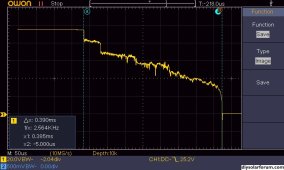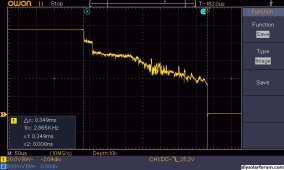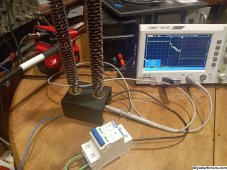efficientPV
Solar Addict
- Joined
- Sep 24, 2019
- Messages
- 1,355
I have several DC breakers from China and decided to test them. These have no agency approvals and who knows how they test them. I have a 55 ohm load and a Xantrex supply that will put out 2A. I set it at 95V which is petty minor duty for something rated at 600V. Just wanted to capture the arc. A word of caution, there seems to be no standard as to which side is the plus or minus. Be careful if you mix and match wiring them all the same. DC breakers have magnets to pull the arc and make it longer when the current creates a magnetic field. Therefore, polarity should be important. Here is the test setup. Next is a trace of the interrupt. Notice the ending arc voltage. Since the magnets and polarity matter, reversing the polarity should be detrimental. Look at the next picture.
This is with polarity reversed. Arc ends sooner and at a higher voltage. I think a single phase AC Square D breaker would do just as well. Both are pretty low ending voltage with two contacts in series.


This is with polarity reversed. Arc ends sooner and at a higher voltage. I think a single phase AC Square D breaker would do just as well. Both are pretty low ending voltage with two contacts in series.





